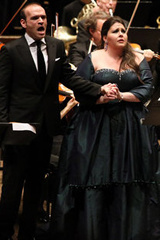| Opera Reviews | 26 April 2024 |
OONY bring I Lombardi thrillingly to lifeby Steve Cohen |
|
| Verdi: I Lombardi Opera Orchestra of New York 8 April 2013 |
|
|
This opera premiered in 1843 when Verdi was 30 years old. Recent audiences have heard two earlier works by him, Oberto and Nabucco, yet Lombardi was staged by the Metropolitan in only one season (1993-94) in its 133-year history. Lombardi has much to offer in the way of innovative music, with more vivid scenes than either of its predecessors, although it is hobbled by a convoluted story. Two brothers feud over the love of one woman, Giselda. One of the brothers is in exile because of a mistaken-identity murder and he renounces his religion, leading to a Christian/Muslim romance in the Holy Land. During the First Crusade, the Christians capture Antioch from their Muslim adversary. In the finale, a churning waltz, the crusaders praise God. Verdi was superb at invoking the patriotic instincts of the Italian people, and their love of family and God. Because Lombardi revivals starred Pavarotti and Bergonzi, people may assume this is a star-tenor vehicle. Not so. The predominant music is for choruses - even more so than in Nabucco with its hymn of the Hebrew slaves - and the most dominant voice during Lombardi's four acts is the soprano (in this production, Angela Meade). Most important to the drama is the bass-baritone who plays Pagano, one of the hostile brothers, who becomes a hermit. Meade has dazzled American audiences and critics with her Elvira in Verdi's Ernani and the title roles in Donizetti's Anna Bolena and Bellini's Norma. She impressed as Giselda in this opera, a challenging role that jumps between high and low and also asks for many floating pianissimi. Near the end of Act II when the crusaders attack Antioch, Meade led the act's closing ensemble with soaring upward runs and an interpolated high D. It is one of Meade's hallmarks that she handles such challenges cleanly and accurately, with no slurring or scooping, and makes the spectacular moments seem almost effortless. Her very best singing was in the opera's last act where Meade forcefully proclaimed Non fu sogno ("It was not a dream.") Bass-baritone Kevin Short had the double role of Pagano and the Hermit, and produced many ringing high notes. His voice is best in its mid-to-high range, a bit weaker in low passages which sound better when sung by true basses. The leading tenor in Lombardi, Oronte (Michael Fabiano), does not appear until the second act and he dies in the third. Another tenor actually gets more stage time than he. Yet Oronte has three gorgeous melodies to sing, and his impact on audiences is extended when his spirit appears from heaven in Act IV, singing In cielo benedetto. Fabiano's opening aria, in three-quarter time, La mia letizia infondere ("If I could instill my joy into her heart") was taken slower than the norm, as Fabiano stretched the legato of some phrases and made the cavatina into a showstopper. The composer did not specify exactly how fast that should be sung, only writing "andante" (a moderate walking tempo) and "with joy." In Lombardi Verdi tried new things such as a miniature violin concerto to introduce an Act III soprano-tenor-bass trio; an off-stage band, and that aria for a deceased tenor. In this production, the eight-person auxiliary band was placed in the next-to-highest balcony on the audience's right and the heavenly tenor sang from the far left corner of the second tier, up against the wall that adjoins the stage. He presented a dramatic image. New York audience members had not previously seen Fabiano in leading roles and they responded with exuberant surprise to his fine singing and to his dramatic persona. He threw himself into his character and ignored his music stand, showing that he had the part totally in his memory. I saw him successfully do big roles during his four years at the Academy of Vocal Arts and now his voice has become even larger. When he sang softly and caressingly, his sound still projected to the far end of the hall. He's ready for leading tenor parts at the Met. In fact, he would have been an asset in this season's performances of La Traviata there. Movie-goers may remember Fabiano's presence in the film The Audition which chronicled the Met's 2007 audition competition. He shared the top prize with Meade, his classmate from the Academy of Vocal Arts and his co-star in that institution's 2008 production of Lucia di Lammermoor. Noah Baetge sang the second tenor role with nice timbre and excellent projection. Eve Queler conducted the orchestra and the large New York Chorale Society with loving affection. At times I would have preferred more snap, crackle and fire from the orchestra. Not everything works in Verdi's youthful composition. The middle of Act II, for example, includes a quickstep chorus that sounds like Gilbert & Sullivan, followed by a women's chorus that resembles children skipping around a maypole. Four years later, Verdi wrote a similar tune for the witches in Macbeth, but the mature Verdi avoided such nonsense. Still, it was thrilling to see this innovative opera rescued from neglect. Photo: Michael Fabiano as Oronte and Angela Meade as Giselda |
|
| Text © Steve Cohen |

 To
commemorate the 200th anniversary of Giuseppe Verdi's birth, the Opera
Orchestra of New York presented his I Lombardi Alla Prima Crociata
("The Lombards on the First Crusade") in concert form.
To
commemorate the 200th anniversary of Giuseppe Verdi's birth, the Opera
Orchestra of New York presented his I Lombardi Alla Prima Crociata
("The Lombards on the First Crusade") in concert form.





